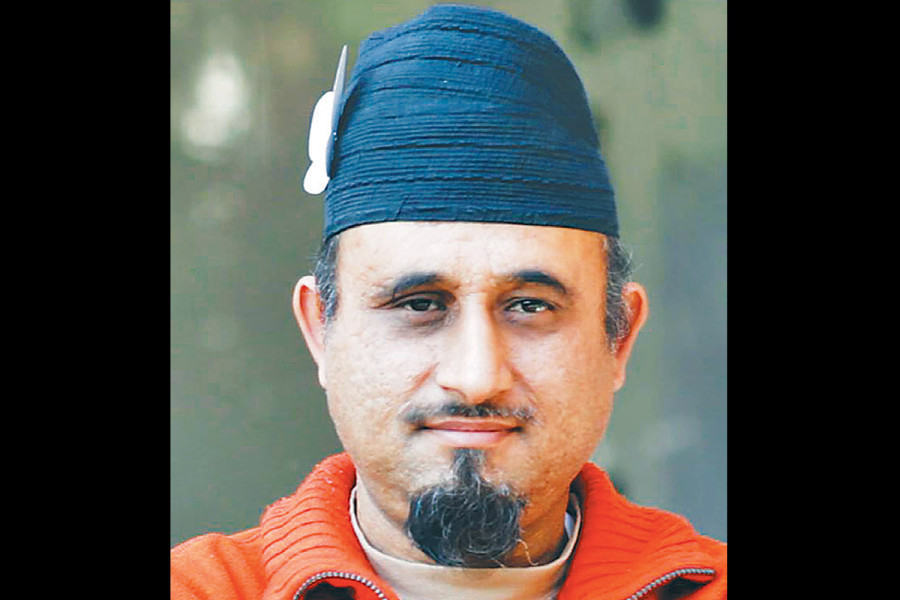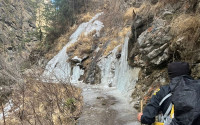National
Ujwal Thapa, who ignited a movement of alternative politics, dies at 44
Thapa started a campaign against corruption, social evils and injustice. It became a political party that inspired hopes among youths and encouraged them to join politics.
Binod Ghimire
He wanted to become an astrophysicist. When he returned to Nepal from the United States, he was a web designer. He worked as an entrepreneur. But ultimately he became the face of alternative politics.
Ujwal Thapa, who ignited a social movement against corruption and social evils and laid the foundation of alternative politics in Nepal, died on Tuesday after suffering multiple health complications caused by Covid-19.
He was 44.
“Ujwal dai [brother] is no more. He passed away at 4:25pm in the course of treatment,” Milan Pandey, coordinator of Bibeksheel Sajha Party, told the Post.
When Thapa thought of a campaign to hold people in power to account, it looked like a small initiative.
Nepal was mired in continuous political squabbling. The game of musical chairs was in full swing. The country was heading towards the Constituent Assembly elections. General strikes, or Nepal banda, were the order of the day. Such bandas by Nepali political parties were organised as a pressure tactic, but they caused a huge inconvenience for the general public, the working class people and those who survived on their daily wages.
Thapa decided to gather a group of like-minded people, mostly youths, to launch a campaign against Nepal banda. Thapa wanted to hammer home the point that “Nepal is khula [open]”.
There were a whole lot of youths frustrated against the same old political faces at the helm, delivering nothing. They saw the prospect of challenging them.
As the group got bigger, the members called it “Bibeksheel Nepali” movement. The aim was to call out all those in power who were not doing their duties, who were corrupt, who were behind causing inconvenience to the general public.
Thapa believed a conscientious, or bibeksheel, movement was needed if a substantial transformation was to be achieved for society.
But how? Was it possible by campaigning from the streets? By holding placards? By calling out political parties and politicians?
Thapa realised if politics had to be changed, he should be part of the same politics.
In 2011, the youths under the umbrella of Nepal Unites launched a campaign to pressure the members of the first Constituent Assembly to deliver the constitution. They staged sit-ins near the Constituent Assembly building in Baneshwar.
“You took your full salary, now deliver us the constitution,” their placards read.
When the country held the Second Constituent Assembly elections in 2013, Thapa and his colleagues decided to transform their movement into a party.
Thapa believed that Nepal was in dire need of alternative politics.
In 2012, the youths founded Bibeksheel Nepali Dal, meaning “a party of conscientious Nepalis”. Thapa was elected as its coordinator.
The party said their idea was that youths needed to join politics to change the political culture of the country.
Two things distinctly stood out—Thapa donning a Nepali topi embossed with the Nepali flag and a black and white smiley.
Thapa in November 2013 said that they wanted to become an alternative to the existing traditional parties.
“We are a fresh alternative to the bandwagon of the old, failed and corrupt leaders that people have gotten fed up with,” Thapa told the Post in an interview.
Thapa, and three others, contested the second Constituent Assembly elections as independent candidates. The party’s election symbol was a dog, a canine emblem the party chose to make a point—that they wanted to play the role of a watchdog.
In 2013, he told The Washington Post that the dog was a symbolic choice from among a host of several other symbols.
“We decided to go with the dog because we want to change the perception,” he said. “We want to think our leaders should be like dogs—but loyal like dogs, honest like dogs and protector like dogs.”
The party’s foray into politics was a disaster.
In a society which is largely dominated by age-old political parties and where politics thrives on client-patron relationship, Thapa’s party had nothing to give except hope and promise of reforms. But politics does not function on hopes and promises.
There were many who wrote off Thapa and his party. But he would not relent.
“He wasn’t a leader of the masses. He was basically an idea man with an excellent skill to convince people with his ideas,” Bijay Babu Siwakoti, who was an integral part of Thapa’s movement in 2011, told the Post. “Unlike the leaders of the traditional political parties, he always promoted new leadership in the party.”

Thapa had started an IT company in 2002–Digital Max Solution. It was a well-established venture when he decided to make his foray into politics. But he stopped his direct involvement in the company after joining politics.
“He has produced dozens of entrepreneurs from his IT company who are performing excellently in the IT sector,” said Siwakoti.
Those who knew Thapa closely say he was a completely different kind of politician compared with the current crop of politicians. His politics revolved around social service, fighting against corruption and eliminating injustice of all forms, according to them.
He never interfered in party functions after Milan Pandey in October 2019 got elected as his successor after Bibeksheel had split with Sajha Party.
Thapa believed in promoting leadership rather than being at the helm. He was a leader of Bibeksheel Sajha Party after the re-merger of Bibeksheel Nepali and Sajha Party last year, according to those who have worked with Thapa.
“He promoted me as the party leader and provided necessary advice once I took over the party leadership,” Pandey told the Post.
Despite the party’s poor performance in the 2017 general elections, Thapa was hopeful that people would some day choose an alternative force over the traditional ones.
Born in Kathmandu, Thapa went to Budhanilkantha School from where he completed the O Levels before flying off to the United States for higher studies.
A soft-spoken person by nature, Thapa was considered a leader who would be happy to share his ideas and views with anyone wanting to listen.
Just before the Constituent Assembly elections, he had faced a huge allegation that he had collected millions of rupees through some con schemes. The charges were never established though.
Thapa was admitted to HAMS Hospital in Dhumbarahi on May 16 after he tested positive for the coronavirus. He was then shifted to Grande Hospital. As his condition further deteriorated, he was taken to Mediciti Hospital on May 24 where he was kept on Extracorporeal Membrane Oxygenation and ventilator support.
As he battled for his life, the outpouring of wishes for his recovery was immense, as Nepalis took to social media, saying Nepal needed a leader like Thapa who ignited the fire of alternative politics, encouraged youths to join politics and who inspired hope among millions of youths.
Despite not making it to any powerful position, Thapa earned huge respect and tributes kept pouring in through social media, in a reflection that there is still a hunger for an alternative force in Nepal and the frustration with the old guards among Nepalis continues. Thapa’s death also comes at a time when Nepal has plunged into the same vicious cycle of dirty politics, which he wanted to clean up.
“Thapa used to say we cannot bring the change we want by cursing the system. We need to take initiatives and become the agent of the change that we want to see,” said Siwakoti. “Not everyone might have a common view on how successful he was in establishing an alternative force, but there is no denying that Thapa did lay the foundation of that idea.”
Thapa is survived by his wife and parents.




 11.84°C Kathmandu
11.84°C Kathmandu













